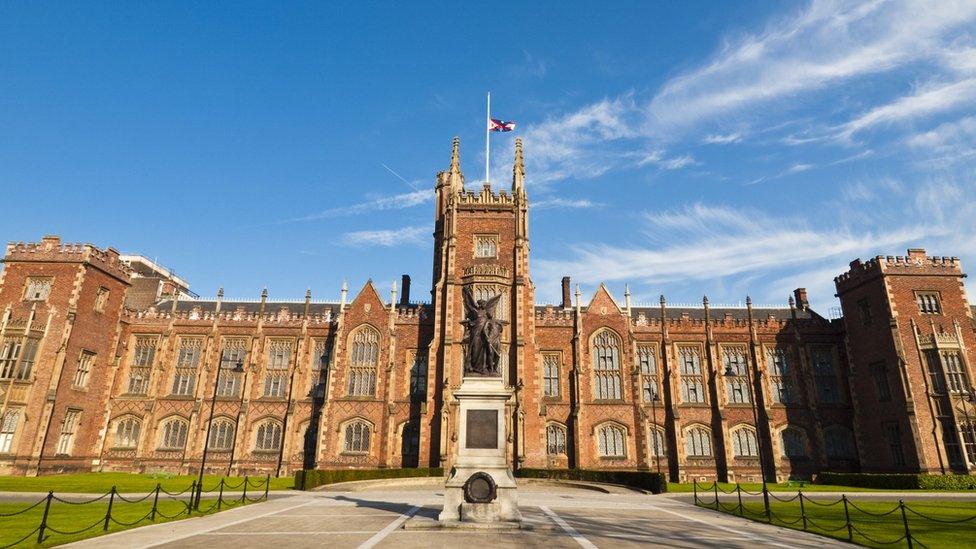'Increasing tuition fees will put people off university'

Beth says any increase in tuition fees will hit working-class students the hardest
- Published
Increasing tuition fees in Northern Ireland will deter people from applying to university, some sixth formers have said.
It comes after leaders of Northern Ireland's five universities and university colleges called for tuition fees to rise by more than £1,000 a year.
They have written to the leaders of the five main political parties asking for the fees to rise to £5,831 a year from the current £4,750.
It is signed by the heads of Queen's University Belfast (QUB), Ulster University (UU) and the Open University in Ireland (OU), and supported by a separate letter from the principals of St Mary's University College and Stranmillis University College.
BBC News NI spoke to pupils at Belfast Girls' Model School in north Belfast.
'How can anyone afford this?'
Beth is 17 and is hoping to do social work at university, but with limited places on courses closest to home, she is looking at studying in Londonderry.
She is already being put off by the costs.
"You're paying £90 a week for accommodation plus living down there, your food, getting a job, travelling up and down home - the expensive is crazy," she said.
"There's communities and estates that struggle to put food on the table never mind paying more to go to university, and the tuition would put a lot of people off."
Courses spanning multiple years, like law, result in students coming out with even more debt," she said.
"I just don't understand how anyone, especially if they come from a working class background like myself, is meant to afford that for the rest of their life," she added.

Ebony is deciding whether to stay at home or move to Liverpool for university
Ebony has her eye on studying physiotherapy in Liverpool, but is leaning towards taking up studies at home due to the costs.
"I don't really think it's ideal for a lot of people because it might put some people off from going to university," she said.
"It might make people feel very anxious and stressed because when you're in university you're thinking: 'Oh when I get out I've got all of this to pay'... and [it's] adding to that stress."

Tegan says thinking about the financial cost of university is stressful
Tegan has decided she wants to go to Liverpool to take up midwifery or paediatric nursing, but the cost of moving away she says is stressful.
"Because of the course I want to do that'll be a lot of time spent working or on placement, so it'll possibly be harder for me to get a part-time job to help pay off tuition."
The school's head of post-16, Lynn Campbell, said the issue was not just around tuition fees.
"It's all of the other expenses on top of that, so by increasing your tuition fees you're just adding to the burden and it's making it more difficult for students to access particularly those from disadvantaged backgrounds," she added.
Increasing student loan borrowing will 'change lives'
- Published31 January
Raising NI tuition fees could generate £98m
- Published5 March 2024
Why do the universities want a rise in tuition fees?
The leaders' letter said about a third of young people leave Northern Ireland to study elsewhere "due to the continued Northern Ireland Executive policy on funding".
The letter said there had been a "real-terms loss caused by a legacy of sub-inflationary uplifts" in funding for higher education.
It added the pressure was "compounded by the reduction in international student numbers and associated income".
"Without urgent intervention, the region's skills pipeline, research capacity, and innovation-led growth are at serious risk-undermining productivity and long-term economic recovery," the letter said.
What do students pay in tuition fees elsewhere in the UK and Ireland?
The letter also pointed out that fees in Northern Ireland are lower than those in England and Wales, where students currently pay £9,250. This will go up to £9,535 in the next academic year.
However, students in the Republic of Ireland pay a maximum of €2,000 (£1,695) a year in fees, while Scottish students who remain in Scotland to study do not pay tuition fees.
In Northern Ireland tuition fees have risen from £3,685 a decade ago to £4,750 in 2024/25.
The vast majority of students take out a loan to cover their annual tuition fees and living costs, which they then pay back when they begin working after graduation.
What do students leaders think?
President of the National Union of Students and Union of Students in Ireland (NUS-USI) Ben Friel said the rise in fees called for by the universities meant "asking students to bear the brunt of a broken system".

Ben Friel, president of the NUS-USI, says education is currently seen as "a burden to the budget"
"Education is seen as a burden to the budget at the moment, but it needs to be seen as an investment for our future and our young people."
Mr Friel said that students were already facing financial pressures, and skipping meals.
"Nearly one in five students are using a foodbank," he said. "We can't be putting more burden on students at a time like this."
What happens now?
The university letter has gone to the leaders of Sinn Féin, the DUP, UUP, SDLP and Alliance Party.
A tuition fee rise of the amount wanted by the universities would have to be approved by the Stormont Executive.
Higher education is the responsibility of Economy Minister Caoimhe Archibald.
- Published5 March 2024

- Published31 January
